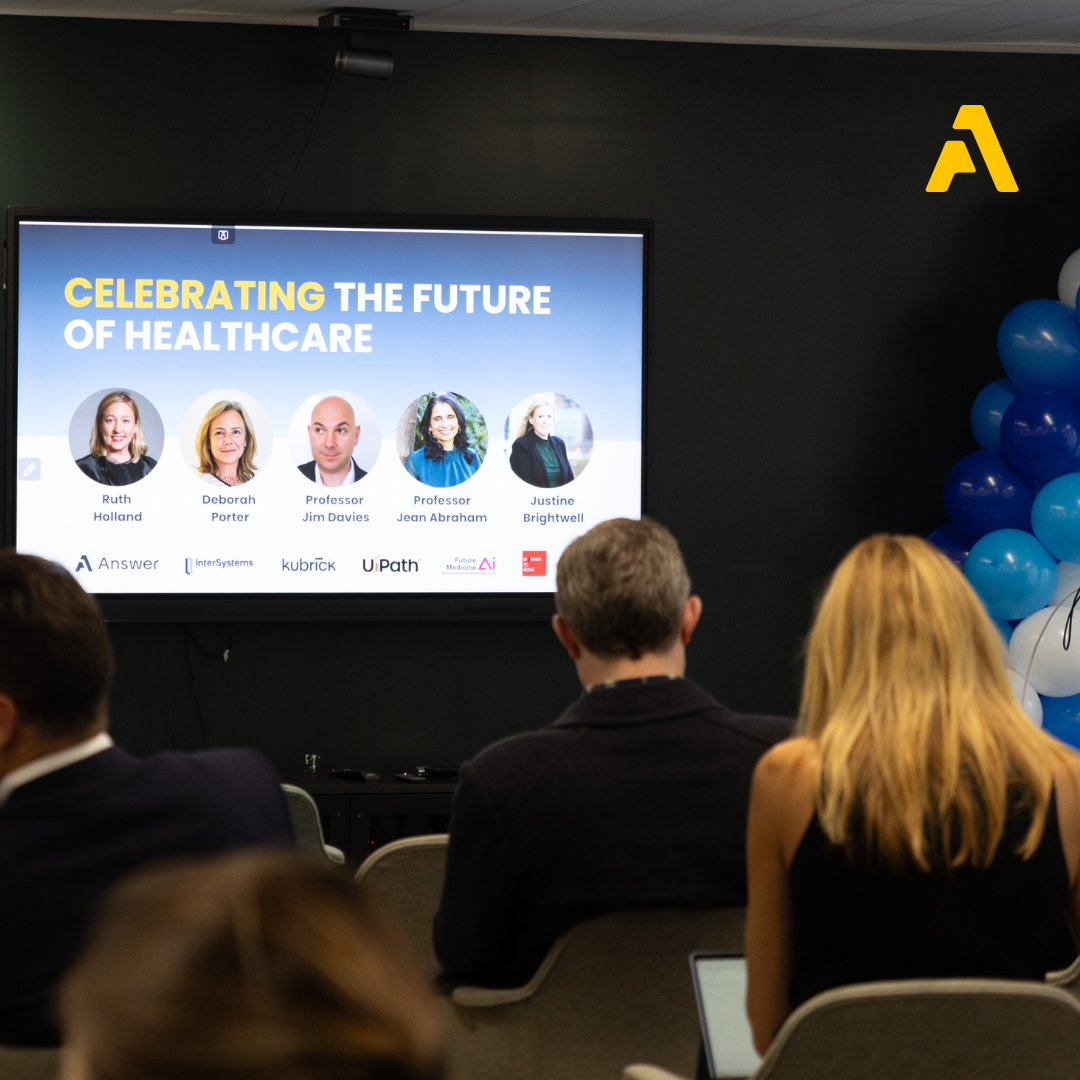
On 2nd October we brought together an extraordinary mix of NHS leaders, academics and industry partners to celebrate progress, share practical lessons, and look ahead with optimism at what’s possible when people, data, AI and science pull in the same direction.
This event; ‘Celebrating the Future of Healthcare’, was deliberately framed as a celebration. As the powerful introduction from Hassan Chaudhury, reminded us; the NHS is powered by people who show up every day to make things better. They deserve recognition, amplification, and support to scale what works.
That spirit set the tone: badge at the door, spotlight on the people doing the work, and a focus on real-world progress. We would like to give a huge thanks to our hosts at Kubrick Group, our partners and sponsors, and, most of all, our speakers for their generosity and candour.
London’s data ambition: building the world’s healthiest global city
Ruth Holland, Chief Data & Analytics Officer at OneLondon, opened with clarity and momentum. London’s health and care system is vast, ~10.6 million people, 5 ICSs, 35 NHS trusts, ~1,385 GP practices, and a thriving life sciences ecosystem. The ambition is simple to say and complex to deliver: secure, joined-up data that clinicians trust and patients feel the benefit of. The London Secure Data Environment (SDE) is already moving, with more than three-quarters of GP practices signed up and a roadmap to scale population-level insight and operational impact across the capital.
Ruth’s key message landed: confidence breeds adoption, when the tools are safe, simple and clinically useful, better care follows.
Next-gen GP EPR: giving time back to care
Justine Brightwell, Programme Head for Digital Primary Care at NHS England, took us inside the “next-gen GP EPR” journey. Primary care handles the vast majority of NHS interactions and underpins national services, 360m+ GP appointments each year, 1.2bn prescriptions, and 65% of NHS App functionality dependent on access to core GP data. But today’s market is fragmented (160+ products, 52 standards) and migration has historically been slow and costly.
The team’s collaborative approach, standards-first design, live national integration adaptors/APIs, and cloud-ready suppliers, is already paying off. Including an 85% reduction in practice migration time (from ~3 weeks to ~3 days) in early moves. The outcome is simple: more reliable systems, smoother workflows, and time released to patient care, exactly where it belongs.
Secure Data Environments: from “superficial” to deep interoperability
Professor Jim Davies, CTO of the Thames Valley and Surrey SDE and Professor at the University of Oxford, brought energy and a chef’s metaphor. If raw data are the ingredients and warehouses are the kitchen, then we need recipes everyone can trust. His team is tackling the hard problems: provenance, de-identification, standardisation and true interoperability across acute, community, mental health, ambulance and primary care data. Governance is in place, data flows are automating, and more than 30 live projects are already using the platform. The takeaway: deep data beats PDFs, we need structured, standardised, and assured information to transform care and research at scale.
Genomics: from headline promise to everyday care
Deborah Porter, Deputy Director, Transformation in the NHS England Genomics Unit, made the case that genomics is not a niche, it’s the next major shift in medicine. The 10-Year Health Plan sets out concrete goals: faster rare disease diagnosis (from years to months), comprehensive genomic analysis for every cancer patient, and pharmacogenomics embedded in routine prescribing to reduce harm and waste. The NHS spends ~£19.9bn on medicines annually and an estimated £2.2bn managing adverse drug reactions, genomics can meaningfully reduce both, while improving outcomes. By 2035, genomics could be part of up to 50% of healthcare interactions, enabled by a Unified Genomic Record and open standards such as HL7 FHIR.
Clinical trials data, shared to save lives
Professor Jean Abraham, Professor of Precision Breast Cancer Medicine at the University of Cambridge, showed how SYNERGIA is integrating multi-modal trial data, genomic, pathology, imaging and clinical, to sharpen prediction, personalise treatment, and accelerate discovery. The call to action was clear: trial data must not live in silos. When responsibly shared and standardised, it has immediate value for today’s patients and downstream value for the next.
What we took away
1. Celebrate progress, loudly. There is so much going right across NHSE and ICBs, let’s scale the wins and back the people delivering them.
2. Design for trust. Secure platforms, transparent governance and usable tools drive clinical confidence and patient confidence follows.
3. Standards are a strategy. Whether it’s FHIR for clinical data or shared models for population health and research, interoperability is a clinical safety issue as much as a technical one.
4. From pilots to platforms. London’s SDE, next-gen GP EPR, and unified genomic records show how repeatable infrastructure can unlock impact across services, research and innovation.
Thank you
To our speakers; Ruth Holland, Justine Brightwell, Prof Jim Davies, Deborah Porter and Prof Jean Abraham, thank you for sharing your work and your candour.
To our host Kubrick Group, our partners and sponsors, and everyone who joined us: you made this a genuine celebration.
At Answer Digital, we believe in leaving the badge at the door and putting the spotlight on the teams making a difference often without fanfare. This event was for you.
Missed it or want to stay in the loop?
Keep an eye on our channels for future sessions and if you’re working on something worth celebrating, we’d love to help you tell that story and scale the impact.